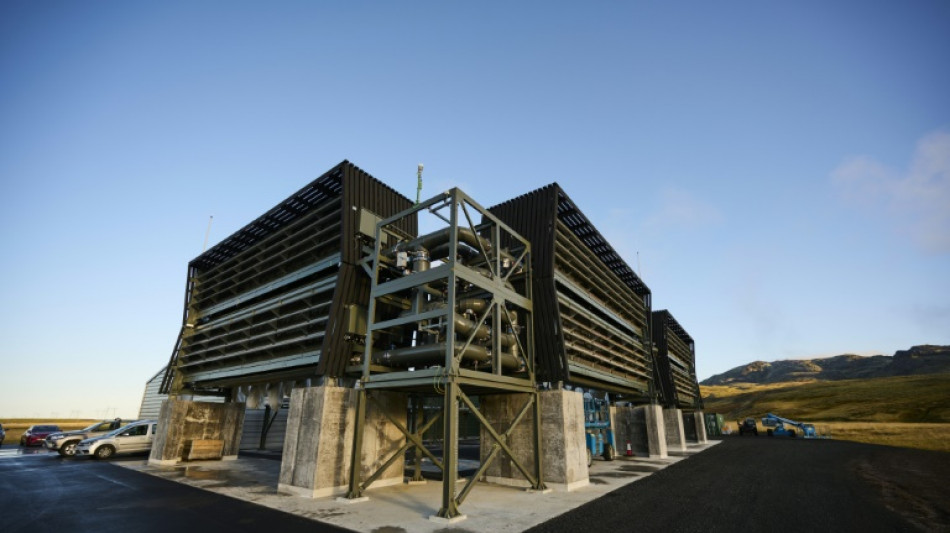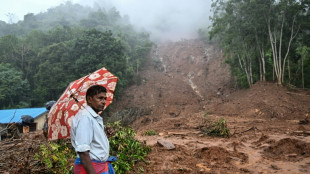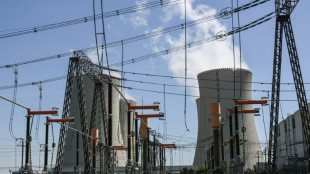
-
 Sri Lanka cyclone caused $4.1 bn damage: World Bank
Sri Lanka cyclone caused $4.1 bn damage: World Bank
-
Billionaire Ellison offers personal guarantee for son's bid for Warner Bros

-
 Tech stocks lead Wall Street higher, gold hits fresh record
Tech stocks lead Wall Street higher, gold hits fresh record
-
Telefonica to shed around 5,500 jobs in Spain

-
 McCullum wants to stay as England coach despite Ashes drubbing
McCullum wants to stay as England coach despite Ashes drubbing
-
EU slams China dairy duties as 'unjustified'

-
 Italy fines Apple nearly 100 mn euros over app privacy feature
Italy fines Apple nearly 100 mn euros over app privacy feature
-
America's Cup switches to two-year cycle

-
 Jesus could start for Arsenal in League Cup, says Arteta
Jesus could start for Arsenal in League Cup, says Arteta
-
EU to probe Czech aid for two nuclear units

-
 Strauss says sacking Stokes and McCullum will not solve England's Ashes woes
Strauss says sacking Stokes and McCullum will not solve England's Ashes woes
-
Noel takes narrow lead after Alta Badia slalom first run

-
 Stocks diverge as rate hopes rise, AI fears ease
Stocks diverge as rate hopes rise, AI fears ease
-
Man City players face Christmas weigh-in as Guardiola issues 'fatty' warning

-
 German Christmas markets hit by flood of fake news
German Christmas markets hit by flood of fake news
-
Liverpool fear Isak has broken leg: reports

-
 West Indies captain says he 'let the team down' in New Zealand Tests
West Indies captain says he 'let the team down' in New Zealand Tests
-
Thailand says Cambodia agrees to border talks after ASEAN meet

-
 Alleged Bondi shooters conducted 'tactical' training in countryside, Australian police say
Alleged Bondi shooters conducted 'tactical' training in countryside, Australian police say
-
Swiss court to hear landmark climate case against cement giant

-
 Knicks' Brunson scores 47, Bulls edge Hawks epic
Knicks' Brunson scores 47, Bulls edge Hawks epic
-
Global nuclear arms control under pressure in 2026

-
 Asian markets rally with Wall St as rate hopes rise, AI fears ease
Asian markets rally with Wall St as rate hopes rise, AI fears ease
-
Jailed Malaysian ex-PM Najib loses bid for house arrest

-
 Banned film exposes Hong Kong's censorship trend, director says
Banned film exposes Hong Kong's censorship trend, director says
-
Duffy, Patel force West Indies collapse as NZ close in on Test series win

-
 Australian state pushes tough gun laws, 'terror symbols' ban after shooting
Australian state pushes tough gun laws, 'terror symbols' ban after shooting
-
A night out on the town during Nigeria's 'Detty December'

-
 US in 'pursuit' of third oil tanker in Caribbean: official
US in 'pursuit' of third oil tanker in Caribbean: official
-
CO2 soon to be buried under North Sea oil platform

-
 Steelers edge Lions as Bears, 49ers reach playoffs
Steelers edge Lions as Bears, 49ers reach playoffs
-
India's Bollywood counts costs as star fees squeeze profits

-
 McCullum admits errors in Ashes preparations as England look to salvage pride
McCullum admits errors in Ashes preparations as England look to salvage pride
-
Pets, pedis and peppermints: When the diva is a donkey

-
 'A den of bandits': Rwanda closes thousands of evangelical churches
'A den of bandits': Rwanda closes thousands of evangelical churches
-
Southeast Asia bloc meets to press Thailand, Cambodia on truce

-
 As US battles China on AI, some companies choose Chinese
As US battles China on AI, some companies choose Chinese
-
AI resurrections of dead celebrities amuse and rankle

-
 Parallel Society Reveals Lineup for 2026 Lisbon Edition - A Cross-Genre Mashup of Cultural and Tech Pioneers
Parallel Society Reveals Lineup for 2026 Lisbon Edition - A Cross-Genre Mashup of Cultural and Tech Pioneers
-
Ai4 2026 Announces Dynamic Keynote Panel Featuring Geoffrey Hinton, Fei‑Fei Li & Andrew Ng

-
 NESR Becomes First Oilfield Services Company to Commission Original Artwork Created from Recycled Produced Water
NESR Becomes First Oilfield Services Company to Commission Original Artwork Created from Recycled Produced Water
-
SMX Strikes Joint Initiative with FinGo & Bougainville Refinery Ltd to Deliver Verifiable Identification for Trillion Dollar Gold Market

-
 Blue Gold and Trust Stamp Execute Strategic LOI to Develop Biometric, Passwordless Wallet Infrastructure for Gold-Backed Digital Assets
Blue Gold and Trust Stamp Execute Strategic LOI to Develop Biometric, Passwordless Wallet Infrastructure for Gold-Backed Digital Assets
-
SK tes Announces Grand Opening of New Shannon Facility, Marking a Milestone for Sustainable Technology in Ireland

-
 FDA Officially Confirms Kava is a Food Under Federal Law
FDA Officially Confirms Kava is a Food Under Federal Law
-
Greenliant NVMe NANDrive(TM) SSDs Selected for Major Industrial, Aerospace and Mission Critical Programs

-
 World Renowned Law Firm Grant & Eisenhofer Files Class Action Lawsuit Against Canadian Banks CIBC and RBC Alleging Illegal Stock Market Manipulation of Quantum BioPharma Shares
World Renowned Law Firm Grant & Eisenhofer Files Class Action Lawsuit Against Canadian Banks CIBC and RBC Alleging Illegal Stock Market Manipulation of Quantum BioPharma Shares
-
NextTrip Announces Pricing of Private Placement Financing of $3 Million

-
 Namibia Critical Metals Inc. Receives Proceeds of $1,154,762 from Exercise of Warrants
Namibia Critical Metals Inc. Receives Proceeds of $1,154,762 from Exercise of Warrants
-
Shareholders Updates


Rapid scale-up of CO2 removal crucial for climate goals
Capping global warming at liveable levels will be impossible without massively scaling up the extraction of planet-warming carbon dioxide from the atmosphere, the first global assessment of CO2 removal warned Thursday.
The persistent failure to draw down greenhouse gas emissions -- nearly 60 billion tonnes a year of CO2 or its equivalent -- has forced once-marginal carbon dioxide removal (CDR) options toward centre stage in climate policy, investment and research.
Across methods ranging from tree planting to factory-sized machines that suck CO2 from the air and store it underground, CDR worldwide currently captures two billion tonnes of the gas each year, according to the State of Carbon Dioxide Report.
More than 99 percent is extracted through "conventional" techniques such as restoring and expanding CO2-absorbing forests and wetlands.
Only a tiny fraction -- about 0.1 percent -- is removed by "novel" technologies such as direct air capture, converting organic waste into rock-like biochar, or capturing the CO2 from plants grown and burned for fuel, more than two dozen experts concluded.
The UN's climate science advisory body, the IPCC, has said carbon emissions must decline some 45 percent compared to 2020 levels by the end of this decade, and to net zero by mid-century, if Paris Agreement goals are to be met.
The 2015 treaty enjoins nations to hold warming to "well below" two degrees Celsius compared to preindustrial levels. The IPCC later concluded that only the agreement's aspirational 1.5C target could prevent severe, and potentially catastrophic, climate impacts.
"Regardless of whether we do a little or a lot of carbon dioxide removal, we will still have to do massive reductions in greenhouse gas emissions," report co-author Gregory Nemet, a professor at the University of Wisconsin–Madison, told AFP.
But CO2 emissions in 2022 remained at near-record levels, thrusting CDR into an even more critical role.
By the end of the century, the report calculates for the first time, CDR must extract between 450 billion and 1.1 trillion tonnes of CO2.
The new report says that conventional, tree-planting CDR -- even if emissions do drop sharply -- must double by 2050 to keep the 1.5C target in play, and increase by 50 percent to hold warming under 2C.
- Scaling up massively -
Research, however, has shown that food, energy and climate needs could result in competition for land, even with efficiency gains in each sector.
A deeply changing climate with only 1.2C of warming to date could also limit potential.
"If warming continues -- and all signs say it will -- then it will be even harder to maintain current levels of conventional CDR because they will be affected by droughts, storms, pests and other impacts," said co-author Oliver Geden, a senior fellow at the German Institute for International and Security Affairs and an IPCC lead author.
That means novel CDR methods have to pick up the slack.
To keep warming under 2C, deployment of these nascent technologies must be ramped up 30-fold by 2030, and by more than 1,000-fold by 2100, according to the report, led by the University of Oxford.
The 1.5C target would require scaling up even faster.
"Many policymakers don't know -- and probably don't want to know -- how much keeping the 1.5C narrative alive actually depends on carbon dioxide removal," Geden told AFP.
One novel CDR technology has attracted more attention -- and money -- than any other, even if it has barely put a dent in global emissions: direct air capture combined with carbon storage (DACCS).
Three quarters of the $200 million (185 million euros) invested in new CDR capacity from 2020 to 2022 went to direct air capture -- a big chunk of it to Switzerland-based Climeworks. The firm announced last week the world's first certified CO2 removal and storage on behalf of paying clients, including Microsoft and software service company Stripe.
"All this investment is based on the assumption that direct air capture can grow from about 10,000 tonnes today to a billion tonnes by 2050" -- a 100,000-fold increase, said Nemet.
That rate of growth is not necessarily out of reach, he said.
In earlier research, Nemet compiled a database of 135 technologies that emerged over the last century, looking at how quickly they scaled up.
The growth rate for solar panels has been about 30 percent a year over 30 years, he found.
"Direct air capture needs to be more than 40 percent for the next 30 years," he said. "It's a huge challenge, but it's not unprecedented."
L.Miller--AMWN